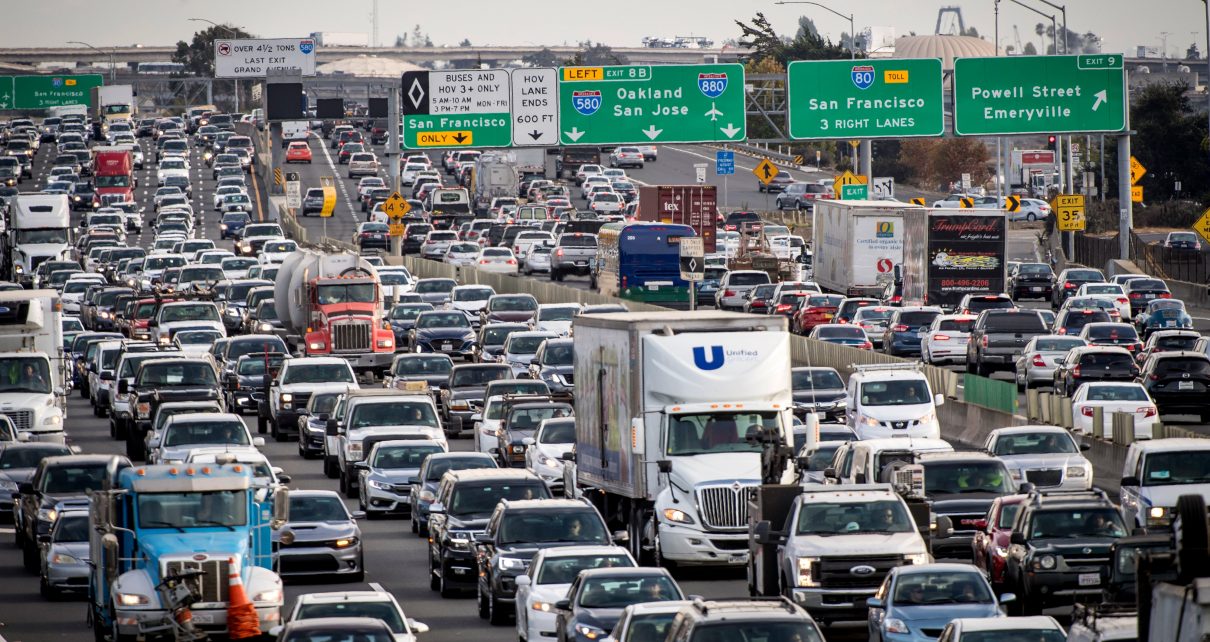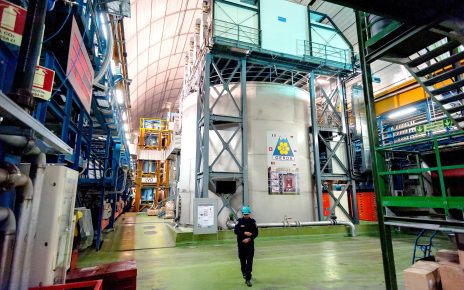The Trump administration yesterday unsheathed the second part of its massive rollback of Obama-era clean car standards, setting the stage for a prolonged legal feud as the nation struggles to address the global coronavirus pandemic.
The long-awaited and nearly 2,000-pageSafer Affordable Fuel-Efficient (SAFE) Vehicles Ruleunravels a 2012 standard designed to significantly curb air pollution and greenhouse gas emissions from cars and trucks (Greenwire, March 31).
EPA and the Transportation Department last fall released part one of the SAFE Vehicles Rule, which prevented California from setting stricter emissions limits than the federal government. That regulation is already subject to challenges in the courts (Greenwire, Sept. 20, 2019).
“We hope that everybody will sit down and review our analysis and understand that this is the right balance to strike for the American people,” James Owens, acting administrator of DOT’s National Highway Traffic Safety Administration, said upon unveiling part two of the SAFE Vehicles Rule.
“So we hope that we will not see litigation,” he said, “but of course we are prepared to defend the rule if such an unfortunate eventuality does arise.”
Environmental groups and state leaders have already pledged to file lawsuits in the coming months over part two of the SAFE Vehicles Rule, which lowers annual efficiency increases for the fuel economy of passenger cars from 5% to 1.5%.
California Attorney General Xavier Becerra (D) called the timing of the rollback, which comes in the midst of a public health crisis, “more than tone-deaf” and rejected EPA’s reasoning that the new standards would decrease pollution, save lives and strengthen the economy.
“You will still see people dying as a result of this rule,” he said in a press conference after the regulation was released. “We are prepared to go to court.”
The top attorneys for Colorado and Massachusetts, both Democrats, also said they intend to sue over the rule.
A multitude of green groups—including the Environmental Defense Fund, Moms Clean Air Force and the Sierra Club—spoke out against decreasing air protections while a viral lung infection, COVID-19, spreads throughout the United States.
“Doesn’t this administration have more important things to do right now?” Gina McCarthy, president and CEO of the Natural Resources Defense Council and former EPA administrator under President Obama, said in a statement. “Rather than focusing on fighting this global pandemic, it’s undermining efforts to address another major health threat.
“We’ll be seeing the Trump administration in court,” she said.
Challengers of the SAFE Vehicles Rule argue that Americans could end up paying less for new cars but ultimately spending more on gas at the pump. And some models show severe public health consequences as a result of the less-stringent rule, which could put more than a billion tons of carbon back into the atmosphere.
Environmental Defense Funddataon the rule’s effects shows a sharp increase in premature deaths and medical expenses, including more than 300,000 new respiratory ailments.
EPA Administrator Andrew Wheelersaidin a press release that the rule delivers on the Trump administration’s “promise” to implement “a sensible one national program that strikes the right regulatory balance that protects our environment, and sets reasonable targets for the auto industry.”
Heartland Institute senior fellow H. Sterling Burnett said in a statement that agencies were right to give Americans the sturdier cars they “want to drive” by easing Obama-era standards. Heartland rejects mainstream climate science.
“Soccer moms, farmers, anglers, and everyday commuters can thank Trump for allowing them to drive the SUVs, minivans, large sedans, and trucks they need to carry their kids to school and events, haul trailers, or move furniture and appliances,” he wrote.
Ann Carlson, co-director of UCLA’s Emmett Institute on Climate Change and the Environment, said the Trump administration’s less aggressive rules “don’t make legal sense.”
She noted that agencies will need to defend their decision to scrap a “well-reasoned” set of climate and air protections, especially when automakers are hungry for more well-defined standards.
“Strong government regulation is the only way to bend the tip of the curve in the transportation sector,” she said. “It’s especially worrisome and problematic to see us retreating rather than leading [the] move to cleaner transportation sources.”
‘Arbitrary’ changes
Lawsuits against the new rules will likely be rooted in the Administrative Procedure Act, which governs federal rulemaking, said Caitlin McCoy, a climate, clean air and energy fellow at Harvard Law School.
Challengers are likely to target the new rule as an “arbitrary and capricious” change to Obama-era standards that provided more environmental stringency and regulatory clarity for automakers.
“What [challengers will] need to try to do is show that the agencies improperly ignored evidence in the record,” McCoy said, adding that the Trump administration’s changes will need to stand up against analysis done by Obama officials.
Greens and states could also argue that EPA and NHTSA are flouting their statutory duties to reduce energy requirements and protect air quality by decreasing environmental protections.
“The hill that they have to climb is for the agency to show that what they’re doing is really justified by some kind of changed circumstance and that it doesn’t look arbitrary in light of all of the evidence,” McCoy said.
Avi Zevin, a senior attorney at New York University’s Institute for Policy Integrity, said that while the government has perhaps fixed some of the major statistical concerns from the proposal, the rule is still not cost beneficial.
“It’s very hard, I think, to convince a court that you are not arbitrary in voluntarily choosing to adopt a rule that imposes more harm than benefit to the American people,” he said.
COVID-19 uncertainty
Some experts say that the coronavirus pandemic could complicate litigation over the new car standards.
Carlson of UCLA noted that with gas prices so cheap now, the administration could use that to defend the costs and benefits of the new rule, namely by claiming that consumers won’t notice an increase in gas prices that are already low.
“They’re going to be making arguments about the fact that gas prices are so cheap that consumers aren’t going to be realizing the savings from tougher issue economy standards than they would have otherwise,” Carlson said.
Current events could also affect whether courts would freeze implementation of the rule at the request of environmentalists and states, she added. With the economy in turmoil, Carlson said courts will need to balance harm to both industry and the public.
“If car manufacturers aren’t selling cars right now, do we impose more stringent regulations on them?” she asked. “You can imagine the administration is going to argue that we shouldn’t.”
But McCoy of Harvard said she thinks pandemic-related delays could end up working in the favor of legal challengers who want to draw out the litigation.
“If you are one of the states or you’re an environmental group challenging these standards, it’s probably in your best interest that that litigation proceed slowly in the hope that there will be a new administration in 2021,” she said.
Reprinted from Climatewire with permission from E&E News. E&E provides daily coverage of essential energy and environmental news atwww.eenews.net.



